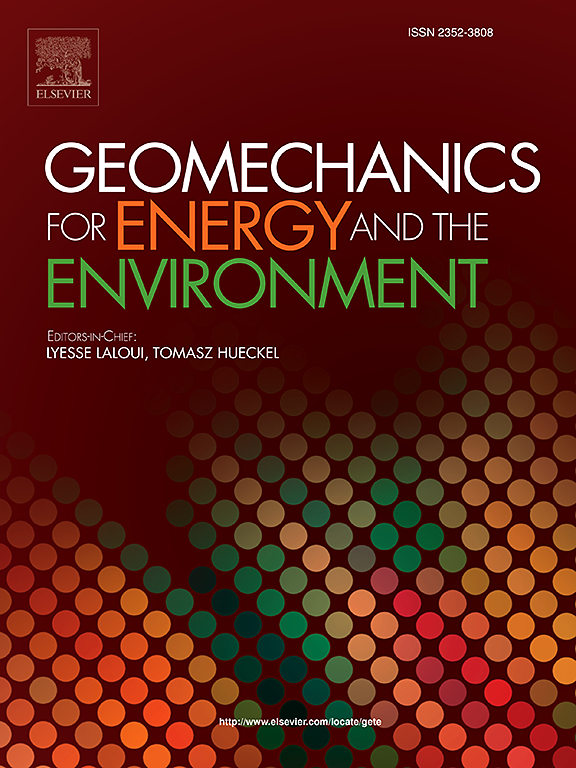卡勒沃-牛津粘土岩热压破裂行为的数值研究
IF 3.3
2区 工程技术
Q3 ENERGY & FUELS
引用次数: 0
摘要
本研究以高水平和中水平长寿命放射性废物处置为背景,探讨粘土岩的热压裂行为。废物包产生的热量会导致主地层内的温度升高,从而引起孔隙压力增大,这主要是由于孔隙水的热膨胀系数与固体骨架的热膨胀系数之间存在差异。如果诱导的孔隙压力积聚过高,主地层将承受拉伸应力,有可能超过其抗拉强度,导致断裂。了解这些过程并改进数字模型以再现这些过程,将有助于设计、优化和保证储存库的安全。本研究是 DECOVALEX-2023 项目的一部分,综合了六个研究团队的工作成果,包括对 Callovo-Oxfordian 粘土岩(COx)样本进行的实验室热延伸试验建模,以及在法国 Meuse/Haute-Marne 地下研究实验室进行的原位热压裂实验。研究小组使用不同的数值代码和不同的方法(包括连续和离散方法)对这两项试验进行建模。实验室测试用于校准团队的模型,如压裂标准。研究小组考虑了饱和条件下的热-水-力学模型。各小组开发的方法表明,他们有能力根据各自的应力分析,在发生时间和位置方面分析和再现 COx 的断裂起始。然而,再现断裂孔径或断裂扩展的尝试不太准确,仍是未来研究的领域,超出了本研究的范围。本文章由计算机程序翻译,如有差异,请以英文原文为准。
Numerical investigation of the thermal hydrofracturing behavior of the Callovo-Oxfordian claystone
This study addresses the thermal hydrofracturing behavior in claystone within the context of the high-level and intermediate-level long-lived radioactive waste disposal. The heat generated by the waste packages will lead to a temperature increment within the host formation, inducing a pore pressure build-up essentially due to the difference between the thermal expansion coefficient of the pore water and that of the solid skeleton. If the induced pore pressure build-up is too high, the host formation will experience tensile stresses, potentially exceeding its tensile strength and resulting in fracturing. Understanding of these processes and improving numerical models to reproduce them will help the design, optimization, and safety of the repository. Additionally, it will contribute to demonstrating robustness by showing that such processes are not expected to occur at the repository scale.
This study was conducted as part of the DECOVALEX-2023 project and synthesizes the efforts of six research teams modelling laboratory thermal extension tests conducted on Callovo-Oxfordian claystone (COx) samples, as well as an in-situ thermal hydrofracturing experiment conducted at the Meuse/Haute-Marne Underground Research Laboratory in France. The teams used different numerical codes with different approaches, including continuum and discrete approaches, to model these two tests. The laboratory tests were used to calibrate the teams’ models, such as the fracturing criterion. The teams considered a thermo-hydromechanical formulation under saturated conditions. One of the key features of their models was the incorporation of changes in the hydraulic properties of the COx through hydromechanical coupling.
The approaches developed by the teams demonstrated their capability to analyze and reproduce fracture initiation in the COx in terms of time of occurrence and location based on their respective stress analyses. However, attempts to reproduce fracture aperture or fracture propagation were less accurate and remain areas for future research, which were beyond the scope of this study.
求助全文
通过发布文献求助,成功后即可免费获取论文全文。
去求助
来源期刊

Geomechanics for Energy and the Environment
Earth and Planetary Sciences-Geotechnical Engineering and Engineering Geology
CiteScore
5.90
自引率
11.80%
发文量
87
期刊介绍:
The aim of the Journal is to publish research results of the highest quality and of lasting importance on the subject of geomechanics, with the focus on applications to geological energy production and storage, and the interaction of soils and rocks with the natural and engineered environment. Special attention is given to concepts and developments of new energy geotechnologies that comprise intrinsic mechanisms protecting the environment against a potential engineering induced damage, hence warranting sustainable usage of energy resources.
The scope of the journal is broad, including fundamental concepts in geomechanics and mechanics of porous media, the experiments and analysis of novel phenomena and applications. Of special interest are issues resulting from coupling of particular physics, chemistry and biology of external forcings, as well as of pore fluid/gas and minerals to the solid mechanics of the medium skeleton and pore fluid mechanics. The multi-scale and inter-scale interactions between the phenomena and the behavior representations are also of particular interest. Contributions to general theoretical approach to these issues, but of potential reference to geomechanics in its context of energy and the environment are also most welcome.
 求助内容:
求助内容: 应助结果提醒方式:
应助结果提醒方式:


